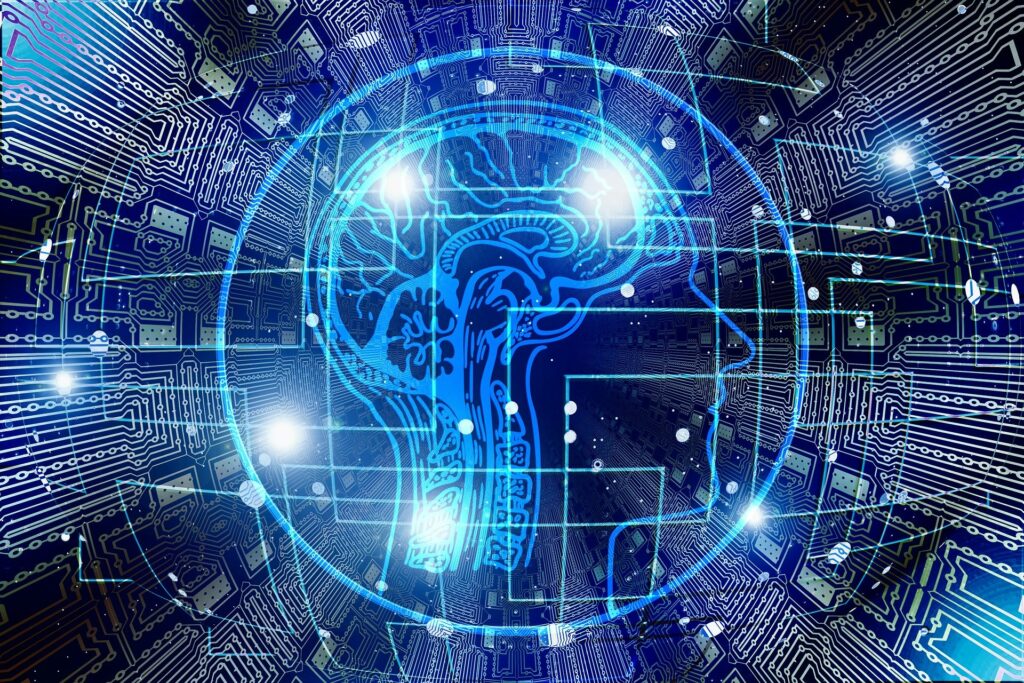The history of humanity is marked by technology, but the latter has experienced an unprecedented acceleration in our modern era. Today more than ever, our decision-makers are relying on technology in the face of the ongoing ecological catastrophe. At the center of these innovations is digital technology presented as the solution. So, belief or reality?

Faced with the ecological crisis, our decision-makers are relying on technology and digital technology. What social project is behind all this?
Man and technology
The development of complex tools and techniques characterizes humans. The first tools allowed prehistoric humans to improve their quality of life by facilitating fishing, hunting, clothing, etc. The development of techniques will then allow breeding and agriculture as well as the progressive mastery of metallurgy. “Technology has thus played a driving role in the evolution of man, transforming his material conditions of existence and bringing him into the time of uninterrupted invention[1] ". Little by little, humans transform their relationship with nature. From a relationship of contemplation and harmony, he arrives at the relationship of predation and exploitation specific to our modern industrial era. This shift would have its roots in the scientific revolution of the 17th century which established the omnipotence of man over nature. It will then be accentuated by the various industrial revolutions. The appearance of machines and mechanization constituted a major revolution which greatly facilitated the lives of men.[2] further strengthening their domination over nature. If the rise of technology and the unprecedented gains in productivity of the 20th century allowed us to raise our standard of living, we are now becoming dramatically aware of the ecological price that we had to pay for this.
Technique, good or bad?
What has led us to the current ecological chaos, according to the philosopher Heidegger in “The Question of Technology”, “is therefore less the development of technology than a way of giving meaning to the world and to things[3] ". He explains that the technique supposed to be “unveiling” has become “provocation” in the sense that it imposes its own law on nature. He warns modern man about technology and its relationship to the exploitation of nature. He urges him not to forget the other modes of revealing nature through celebration, contemplation, harmony, etc. If he continues on this predatory path, modern man, Heidegger tells us in 1949, will also be a victim of this utilitarian logic and perceived as a fund, a resource exploitable for profit.
The technique has always aroused controversy, because the uses that men have made of it have revealed the best and the worst. François Jarrige, professor of contemporary history, identifies the dividing line between the supporters of the technique and their detractors: the former consider it as a neutral tool and therefore cannot be questioned, while the latter see it as a tool of domination and to be able to. Pope Francis, in his encyclical Laudato Si (2015), develops a very critical plea on the technocratic paradigm. According to him, “the objects produced by technology are not neutral because they create a framework which ends up conditioning lifestyles and orienting social possibilities in line with the interests of specific groups[4] ". We see this with the penetration of digital technology into all aspects of our lives where a handful of actors monopolize colossal financial profits that weigh heavily on power relations.
All about digitalization!
Today more than ever, high technologies seem to constitute for our political leaders the solution to the crises our world is going through. The Green Deal for Europe gives them pride of place. In all recovery plans and strategic texts of our policies, digital technologies and their derivatives (AI, Internet of Things, cloud, etc.) rise to the same rank as the ecological transition. “The transition to climate neutrality also requires smart infrastructure[5] ". In the Belgian recovery plan, digitalization is the pole which received the highest financial envelope, i.e. 26.6% of plan expenditure[6]. The announced objectives are the fight against cyberthreats, the digitalization of public services and the development of 5G. It is interesting to note that there are 886 occurrences of the word “digital” in this recovery plan! Green transition and digital transition seem to go hand in hand.
More than a tool, digital appears as an end in itself. Above all, we should not fall behind neighboring countries in the race for digitalization. 5G has barely arrived when we are already talking about 6G or even 7G. This unprecedented acceleration seems to have failed to question the desired societal project, the objectives and purposes underlying the deployment of these technologies. “It is not permissible to think that it is possible to defend another cultural paradigm, nor to use technology as a pure instrument, because today the technocratic paradigm has become so dominant[7]» the Pope tells us in his ecological encyclical Laudato Si.
And yet, we have the right to question the merits of this digital transition[8]. Nothing has confirmed so far that digital technology has made it possible to reduce humanity's ecological footprint. On the contrary, it is the sector where greenhouse gas emissions are increasing the most. “Related to the footprint of humanity, the progression of digital impact indicators (energy, GHG, water, electricity) is much faster than the majority of other sectors of the economy[9] » we can read on the website of the Public Service of Wallonia based on data from Green.It France.
Why won't technology be enough?
The proliferation of technophile discourses today, ardently taken up by our politicians, is undoubtedly linked to the scale and urgency of the ecological catastrophe. Overwhelmed and frightened, it is tempting to let ourselves be seduced by technological mirages. Philippe Bihouix draws up an interesting inventory[10] of these theories, the cornucopians (from the Latin cornu copy, cornucopia) for whom natural resources are infinitely available, to techno-slavers for whom NICTs will make it possible to replace human labor, through to anthropo-augmentist utopias which find their apogee in transhumanism.
We believe, like Philippe Bihouix, that technophile promises will not come true, because they underestimate three important phenomena[11] .
The first is the systems dimension. Our society is based on macro-systems (energy, transport, industry, etc.) that are not easily transformed. While it is easy to stack one system on top of another, it is much more complicated to replace it. “This is why, for example, beyond the technical or financial issues, the development of a hydrogen energy network is far from obvious; the effort to deploy, replace pipelines, port facilities, storage areas, refineries, gas stations, etc. by their hydrogen equivalent, is much more important than it seems and has nothing to do with the installation of a few thousand mobile telephone base stations[12] ". If feats can be achieved on a small scale, Bihouix tells us, such as creating a house from a 3D printer, their generalization will probably never take place.
The second element is the question of the non-renewable natural resources on which these technologies depend and the systemic link between energy and resources. All technology is material even if we tend to hide it in the digital context. They depend on energy (coal, oil, gas) and increasingly specific metals to function. Let's think about the 60 mineral extracts that make up a smartphone. And these resources tend to become scarce. They are less abundant than before, more difficult to access and discoveries are decreasing while future projections show a significant increase in demand for them. Recycling metals, which could compensate, comes up against the increasing complexity of our objects and will be insufficient to meet demand.
The third element is the cost of deploying these technologies. “How many of these technologies will be economically accessible to our societies”? Bihouix questions. Will they benefit from the investments necessary to be deployed on a large scale when our public services are already underfunded? In many cases, the price will prove prohibitive and limiting.
Finally, the capitalist economic logic that structures our world today prevents certain technologies from being used wisely, that is to say in favor of the common good. “The world abounds in brilliant innovations which deserve to be used as means to master the ecological crisis, but which never will be because they go against the demands of accumulation[13] ".
Find the purposes of our company
As citizens, we are not consulted about the arrival of new technologies. We are not included in the decision-making processes that determine which technologies will be part of our lives tomorrow. Of course, our freedom comes into play in our purchasing choices. But certain technologies (smartphone, computer, etc.) are becoming so widespread that they become practically essential. Even more so when they are supported by public policies. Thus, digital technology has transformed our daily lives in recent years, automating our public services, computerizing our professional practices, our access to knowledge, etc. The Covid crisis also worked in its favor, sweeping away the latest criticisms about it.
Between the projects carried out by our leaders and the aspirations of citizens, the gulf seems bigger and bigger. When our leaders only have 5G to offer, it is the symptom of a void, a political vacuum[14], François Ruffin tells us in his latest book. It now seems obvious to us that technologies, which reinforce the materialism of our societies, are not synonymous with happiness and well-being for all. Ruffin brings to the forefront the primacy of the social bond expressed by citizens themselves, attention to those close to them, and the community as a vector of trust and social cohesion. Fighting more against inequalities would make it possible to reduce the importance of the social image based on material possession.
Bihouix goes in the same direction when he says that “it is in fact undeniable that everything that made us Men – namely what surrounds us, because Man is a social animal which is constructed in otherness – nature , the city on a human scale, family and social relationships, value systems, the transmission of knowledge, etc., are shaken up, transformed, called into question and sometimes swept away by technological developments. The end of humanity to fear is perhaps not the end of Men, but of a good part of what has until now constituted us as human beings.” To what extent are technologies transforming our way of being towards others and the world around us?
This is why we join François Ruffin in the need to redefine progress, not as technical, but human.[15], by promoting in particular the dimension of care given to others, kindness, education, dialogue, moderation or temperance. Because “progress is admitting limits, setting them, and imposing them. We need these limits, they do us good[16] ". The Pope goes in the same direction and invites us to slow down: “The time has come to pay attention again to reality with the limits it imposes. It is possible to broaden the outlook again and human freedom is capable of limiting technology, of directing it, as well as putting it at the service of another type of progress, healthier, more human, more social, more integral[17] ".
For this, collective questioning of needs is essential. Let's stop thinking that all innovation is worth making. We must consult democratically on what our society decides to produce or not and renounce ecological absurdities such as the numerous connected objects that we are promised for tomorrow, or even 5G. In the low tech spirit[18], re-orienting research and innovation based on saving resources and energy is more essential than ever.
PS: To those who deride criticism of technologies, we will respond that “opposition to technical change does not consist of a refusal of technology, it aims to oppose the social and political order that it this vehicle; more than a refusal of change, it is a proposal for an alternative trajectory. But we still need to hear what the opponents say, understand their reasons instead of stigmatizing their supposed ignorance[19] ".
Geraldine Duquenne.
[1] LETENDRE L., Is our relationship with the world essentially technical?, 2019.
[2] Even if the appearance of machines also sparked waves of protest from workers who saw their jobs disappear. Let us cite for example the Luddite movement.
[3] Ibid.
[4] STIEGLER B., https://www.franceculture.fr/emissions/les-chemins-de-la-philosophie/profession-philosophe-6262-bernard-stiegler-il-ne-faut-pas-rejeter-les-techniques-mais-les-critiquer
[5] Green Deal, p.7.
[6] National Plan for Recovery and Resilience, June 2021, p. 12.
[7] Encyclical Laudato Si of Pope Francis, 2015.
[8] For this, see the analysis by Géraldine Duquenne, “Digital sobriety, the only possible choice”.
[9] SPW, “ The digital footprint: an unprecedented increase », 2019.
[10] To discover on this link.
[11] Philippe Bihouix, Technosciences, or corrupted utopia, When the ideology of progress captures our future, In Crier Review 2015/2 (No. 2), pages 112 to 127.
[12] Ibid.
[13] KOVEL Joel, Capital and the domination of nature, in Ecology and Politics, 2009/1 (n°38).
[14] RUFFIN F., Their progress and ours. From Prometheus to 5G., 2021, P.83.
[15] RUFFIN F., Their progress and ours. From Prometheus to 5G., 2021, P. 83.
[16] RUFFIN F., Their progress and ours. From Prometheus to 5G., 2021, P. 125.
[17] Encyclical Laudato Si of Pope Francis, 2015, p. 102.
[18] See Géraldine Duquenne’s analysis « Low tech and sobriety as drivers of the ecological transition ".
[19] JARRIGE François, Techno-critiques. From the refusal of machines to the contestation of techno-sciences. Paris, Discovery, 2014, p. 12.





